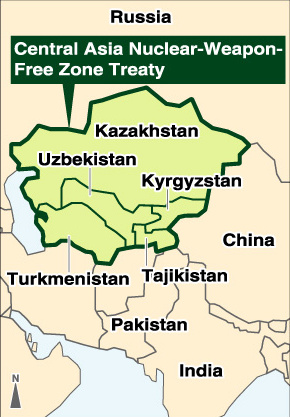Nuclear weapons can be eliminated: Enactment of Central Asian Nuclear-Weapon-Free Zone Treaty advances disarmament
Mar. 26, 2009
by Keisuke Yoshihara, Staff Writer
The Central Asian Nuclear-Weapon-Free Zone Treaty came into effect on March 21. This is the fourth such multinational treaty. The pact will promote nuclear disarmament and the vision for a similar northeast Asian nuclear-free zone that would include Japan and the Korean peninsula.
This treaty involves Kazakhstan, Kyrgyzstan (The Kyrgyz Republic), Tajikistan, Turkmenistan, and Uzbekistan. It forbids the five countries to develop or possess nuclear weapons, or dispose of other nations’ nuclear waste in these countries. It finally came into effect after the five countries all signed and ratified it.
At the same time, a provision of the treaty which demands that other countries not use or threaten to use nuclear weapons within the region, so-called “negative security assurance,” is not yet binding. This is because the enactment of this provision requires the nuclear weapons states to sign and ratify it, but the United States, the United Kingdom, and France do not support it.
These Central Asian nations became nuclear powers after the collapse of the former Soviet Union. The leaders of the five countries agreed on the concept of the treaty, and negotiations have been conducted by the United Nations Regional Centre for Peace and Disarmament in Asia and the Pacific.
Nuclear-Weapon-Free-Zone Treaty
A nuclear-weapon-free-zone treaty is a treaty in which non-nuclear nations in a particular region agree, on their own initiative, not to allow the development, production, storage, or deployment of other countries’ nuclear weapons on their territories. Since the 1960s, three such treaties have gone into effect, mainly in the southern hemisphere. These treaties are: the Treaty for the Prohibition of Nuclear Weapons in Latin America and the Caribbean (1968), the South Pacific Nuclear-Free-Zone Treaty (1986), and the Treaty on the Southeast Asia Nuclear-Free Zone (1997). The African Nuclear-Weapon-Free-Zone Treaty was signed in 1996, but has not yet come into effect.
(Originally published on March 21, 2009)
Related articles
Central Asian Nuclear-Weapon-Free Zone Treaty comes into effect (March 26, 2009)
The Central Asian Nuclear-Weapon-Free Zone Treaty came into effect on March 21. This is the fourth such multinational treaty. The pact will promote nuclear disarmament and the vision for a similar northeast Asian nuclear-free zone that would include Japan and the Korean peninsula.
This treaty involves Kazakhstan, Kyrgyzstan (The Kyrgyz Republic), Tajikistan, Turkmenistan, and Uzbekistan. It forbids the five countries to develop or possess nuclear weapons, or dispose of other nations’ nuclear waste in these countries. It finally came into effect after the five countries all signed and ratified it.
At the same time, a provision of the treaty which demands that other countries not use or threaten to use nuclear weapons within the region, so-called “negative security assurance,” is not yet binding. This is because the enactment of this provision requires the nuclear weapons states to sign and ratify it, but the United States, the United Kingdom, and France do not support it.
These Central Asian nations became nuclear powers after the collapse of the former Soviet Union. The leaders of the five countries agreed on the concept of the treaty, and negotiations have been conducted by the United Nations Regional Centre for Peace and Disarmament in Asia and the Pacific.
Nuclear-Weapon-Free-Zone Treaty
A nuclear-weapon-free-zone treaty is a treaty in which non-nuclear nations in a particular region agree, on their own initiative, not to allow the development, production, storage, or deployment of other countries’ nuclear weapons on their territories. Since the 1960s, three such treaties have gone into effect, mainly in the southern hemisphere. These treaties are: the Treaty for the Prohibition of Nuclear Weapons in Latin America and the Caribbean (1968), the South Pacific Nuclear-Free-Zone Treaty (1986), and the Treaty on the Southeast Asia Nuclear-Free Zone (1997). The African Nuclear-Weapon-Free-Zone Treaty was signed in 1996, but has not yet come into effect.
(Originally published on March 21, 2009)
Related articles
Central Asian Nuclear-Weapon-Free Zone Treaty comes into effect (March 26, 2009)








